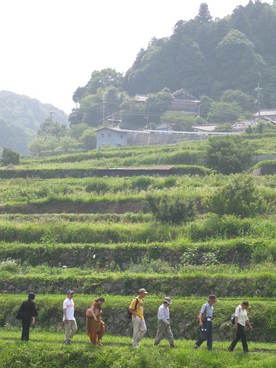Fifteen Asians United Over Climate Change
Asia and Oceania Section
Japanese Studies and Intellectual Exchange Dept.
The Japan Foundation
"JENESYS Future Leaders Programme"--A Starting Point for Coping with Climate Change
In recent years, the issue of climate change has been attracting increasing attention. Climate change measures cannot be taken by one country alone. International cooperation is needed. In September 2010, young leaders from East Asia who are expected to play important roles in their respective countries in the future gathered in Japan. They spent a full week together debating the issue of climate change in earnest.
The Japan Foundation began the "JENESYS East Asia Future Leaders Programme" in 2007, in corporation with the Ministry of Foreign Affairs. The program provides future leaders from East Asia with an opportunity to understand Japanese culture and society. It also aims to give them a chance to talk and think about issues common to countries in the region and deepen mutual understanding and cooperation, thereby forming a close network and forging a common identity.
One of the programs for 2010 took place over a one-week period, from September 12 to September 18, on the theme of "Climate Change Measure in Asia: A Review of Daily life and Social/Economic Structure." A total of 15 administrative officials tackling the problem of climate change (two officials each from Cambodia, Vietnam, Myanmar, Laos, Indonesia and Thailand; and one each from the Philippines, Singapore and Japan) participated in the program, which included a tour of Tokyo, Hiroshima, Kyoto and Fukushima.
The program opened with a meeting to exchange opinions at the Ministry of Foreign Affairs in Tokyo. Following a keynote speech by Professor Yukari Takamura of Ryukoku University, the participants held lively discussions on such topics as the international climate change regime beyond 2012, their expectations for the Conference of the Parties to the United Nations Framework Convention on Climate Change (COP16 in 2010 and COP 17 in 2011) and the way multilateral negotiations on climate change should be conducted. They also outlined climate change policies being pursued in their respective countries. The meeting was very productive as they talked energetically about their countries' efforts and challenges. They also paid a courtesy call on Parliamentary Vice-Minister for Foreign Affairs Chinami Nishimura.
The participants showed a keen interest in the places they visited, including those in Kyoto where they made a cultural tour on the last day of the program. They listened intently to the introductions and lectures given at the places they visited.
At the Panasonic Center Tokyo in the capital's Odaiba district, the participants visited a showroom which displayed ecology-oriented and energy-saving models of products and were able to experience using the latest technology by working on a computer. At the Hiroshima Peace Memorial Museum, they listened to the experiences of a hibakusha (an atomic bomb survivor) and rekindled their desires for peace. The participants and the speaker exchanged firm handshakes and even hugged each other. During their visits to Ooi Nuclear Power Plant in Fukui Prefecture and Maizuru Power Sation in Kyoto Prefecture, the participants were deeply impressed by the fact that each and every worker was aware of the importance of measures to combat global warming.
The circle of friendship widens through discussions on climate change
Through this program, the young leaders from East Asia were able to get a feel of Japan's proactive climate change measures and contributions. They were reminded that Japan had shown its leadership when it hosted the 2008 G8 Summit, where global warming was one of the main topics, and that the development of technology for the creation of a low-carbon society has raised Japan's international competitiveness.
The participants said that as the same Asian citizens, they wanted to continue to develop good relations with Japan. They also said they were extremely happy to have learned many things, including their countries' weaknesses in climate change measures and their future challenges.
One of the participants, Mr. Rendra Kurnia Hasan of Indonesia (Legal Officer at the Climate Change Impact Control of the Ministry of Environment in Indonesia), said, "I only had a stereotypical image of Japan, but my impression of the country has changed because I was given this chance to stay here. I want to forge better relations between our countries through discussing the topic of climate change." His comment indicates that the program provided a good opportunity for the participants to understand Japanese society and culture.
The program brought about trust and friendship among the participants, and interchange between them appears to be continuing even after the end of the program. We received many messages like "I want to visit Japan again with the same members." It was a short program lasting only seven days, but we hope that the "JENESYS East Asia Future Leaders Programme" will continue to contribute to strengthening good relations between Japan and ASEAN countries.

Participants in a similar exchange program visiting terraced rice fields
Related Events
Keywords
Back Issues
- 2024.3. 4 Movie Theaters aroun…
- 2023.4.10 The 49th Japan Found…
- 2023.3.28 JF's Initiatives for…
- 2023.1.27 Living Together with…
- 2022.11.16 Inner Diversity <…
- 2022.6.21 The 48th Japan Found…
- 2022.3.22 JF's Initiatives for…
- 2022.3.14 JF's Initiatives for…
- 2022.2.14 JF's Initiatives for…
- 2022.2. 4 JF's Initiatives for…

